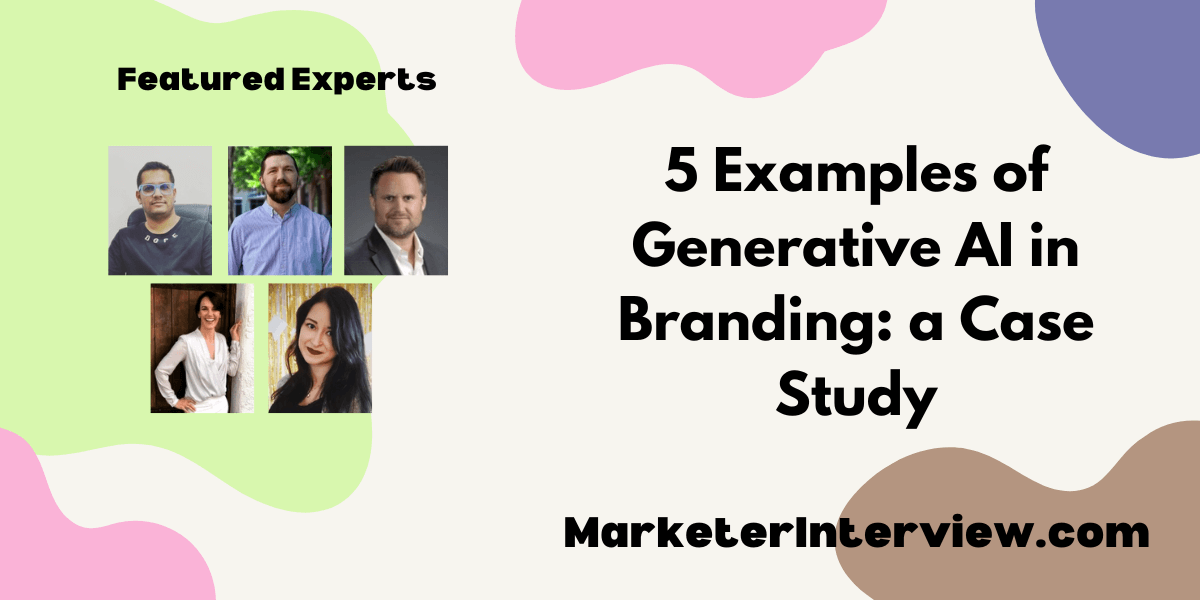5 Examples of Generative AI in Branding: a Case Study
In the fast-evolving landscape of branding, generative AI is making waves, as evidenced by the insights from five industry experts, including a senior merchandise & marketing specialist and a president. From exploring AI-generated art to personalizing branding experiences, these professionals delve into specific examples and discuss the implications for branding and marketing.
Want to get quoted in MarketerInterview.com content just like this? Apply to become a contributor today!
Contents
Exploring AI-Generated Art
We have had a great time harnessing the power of art creation via an AI platform. The platforms that offer AI-generated art by keywords are useful for brainstorming. Unfortunately, we still run into QA issues with spelling and basic design points from time to time. We expect these types of kinks to be worked out as we continue using and fine-tuning each platform.

Candace Cotton, Sr Merchandise & Marketing Specialist, Halo Branded Solutions
Trying Custom Logo Design
One way generative AI is being used for branding purposes is through the creation of custom logos and designs. Traditionally, companies would hire graphic designers or purchase stock images for their branding needs. However, with generative AI, businesses can now have a logo generated specifically for them based on their brand’s identity and target audience. This saves time and resources and ensures that the logo is one-of-a-kind.
For me, using AI to create custom logos and designs is very efficient, since companies can now easily refresh their branding without completely rebranding. This allows for a more dynamic and agile approach to branding, keeping up with the ever-changing market trends and consumer preferences.

Tristan Harris, Demand Generation Senior Marketing Manager, Thrive Digital Marketing Agency
Enhancing Marketing with Video
As a CMO at Content Whale, I believe generative AI can boost the creativity and productivity of marketers and content writers. It can create original and engaging content for branding and marketing.
For example, Synthesia can make realistic videos with custom features. This can help brands interact with their audience. I think generative AI should be used with human input and quality checks. This way, we can ensure the content is relevant, accurate, and ethical.

Bhavik Sarkhedi, Growth Head & CMO, Content Whale
Studying Coca-Cola’s AI-Driven Creative Campaign
The most prominent recent example of AI being used for branding is Coca-Cola’s “Create Real Magic” campaign. They launched a digital platform that allowed artists to use AI tools to remix Coke’s branding assets and imagery to create new graphic designs and illustrations. The winning submissions were then displayed on billboards in major cities.
From a marketing perspective, this was a clever way for Coca-Cola to engage creative communities and fans to help shape how their brand appears in an artistic light. By providing the AI tools and brand elements, it allowed for continuous user-generated content showcasing Coke in novel ways. This helped make the brand feel more contemporary, interactive, and in on the latest tech trends.
It’s also beneficial for the brand’s image to be associated with a platform that enables creative expression. Having AI-generated designs featured on high-profile outdoor ad spaces like billboards further exposed the brand to new audiences in an engaging format. It’ll be interesting to see how other large brands similarly leverage these technologies for interactive campaigns.

Juliet Dreamhunter, Founder & AI Strategist, Juliety
Personalizing Branding Experiences
Generative AI has increasingly been leveraged in branding endeavors, notably exemplified by its application in creating personalized content and experiences. Take, for instance, a recent campaign where a cosmetics brand utilized generative AI to develop custom makeup looks tailored to individual customers’ preferences and skin tones.
From a branding and marketing perspective (from me, someone involved in reputation management), this innovative use of AI not only enhances customer engagement and loyalty but also showcases the brand’s commitment to innovation and personalization.
By harnessing the power of AI to deliver unique and relevant experiences, brands can establish stronger emotional connections with their audience, driving brand affinity and ultimately bolstering their reputation as forward-thinking and customer-centric entities.

Matt Earle, President, Reputation.ca
Want to get quoted in MarketerInterview.com content just like this? Apply to become a contributor today!






